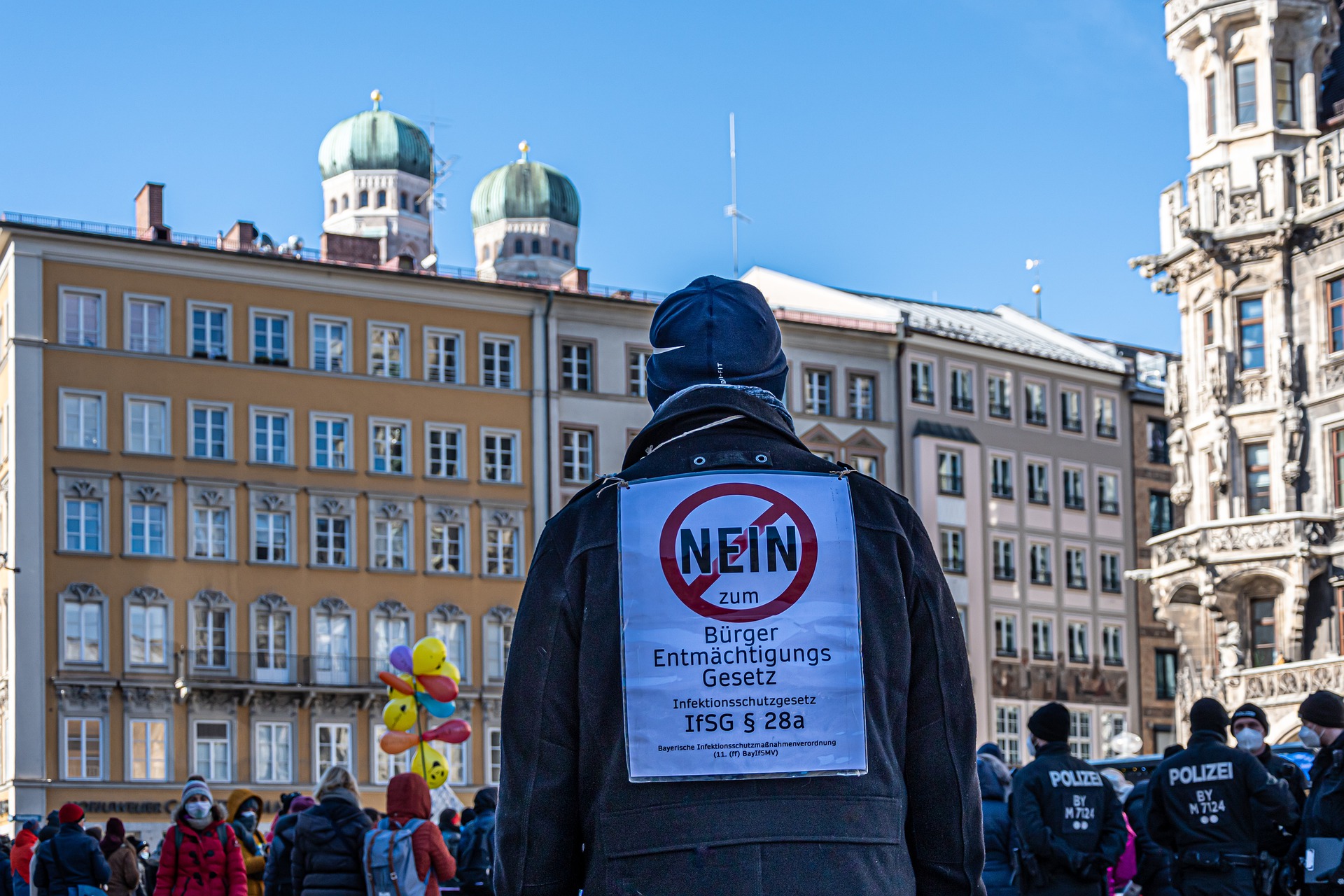Trouble Is Brewing in Germany
Over the past two years, the heterogeneous Querdenker movement against Germany’s coronavirus restrictions has radicalized sharply, involving not only far-right ideologues but also average German citizens who are tired of “peaceful resistance” against pandemic measures.

Published by The Lawfare Institute
in Cooperation With

On March 20, Germany dropped the last of its “extensive protection measures” against the coronavirus and returned to a wary form of normality. But while Germany may have decided that it is done with the pandemic for now, the pandemic—or rather the societal damage it wrought—is certainly not done with Germany. Trouble is brewing on German streets.
Over the past two years, the heterogeneous protest group against Germany’s coronavirus restrictions known as the Querdenker movement—“Querdenker” roughly means one who thinks laterally or outside the box—has radicalized sharply. Violence has followed. The Federal Office for the Protection of the Constitution (Bundesamt für Verfassungsschutz, or BfV)—the German equivalent to MI5 in the United Kingdom—placed elements of the group under observation as a potential threat to Germany’s free democratic constitutional order in April 2021. An analysis by the state branch of the BfV from North Rhine-Westphalia (NRW) in May 2021 warned of the movement’s “missionary” drive to win converts and desire to take back control of the country from a conspiratorial elite. By that time, the NRW Verfassungsschutz wrote, the movement’s original aim of protesting the state interventions against the pandemic had faded into the background as the protests were used increasingly to make politicians, the federal and state governments, and the media into “the object of protest and hatred.”
While the movement has had an important impact on the Alternative für Deutschland (AfD), Germany’s largest far-right party, which has sought to become the “parliamentary arm” of the coronavirus protests, focusing too much on the AfD misses dangerous new developments in the movement itself.
The Querdenker movement began quite early in the pandemic with small protests taking place throughout Germany against the measures taken by the government to combat the virus’s spread. But it was the foundation of the initiative “Querdenken 711” in Stuttgart by Michael Ballweg, a software engineer, that gave the protests the network and professional capacity to expand. Throughout 2020 and 2021, the movement staged massive protests across Germany with tens of thousands of people, including one in August 2020 in Berlin, where a group of right-wing extremists broke through the police barriers and stormed the steps of the German Bundestag. More recently, the movement has begun to organize protests in smaller towns, seemingly to avoid counterprotesters and better dominate the streets to create the impression that they represent a majority of Germans.
Politically, the movement’s adherents are incredibly diverse—neo-Nazis have marched alongside families with strollers alongside hippies—and in some cases have legitimate concerns. Yet they share a deep disillusionment with the institutions of liberal democracy. It is exactly this diversity that makes the movement hard to quantify.
Nevertheless, in its online and physical presence, a kind of belief system with profoundly different levels of radicalization can be seen. The movement’s most militant members represent the more ideological and visible end of a spectrum that stretches back to the middle of German society. Marching in front of the homes of government officials with torches requires a willingness to risk identification by the police, one that develops largely unseen and over time in online chatrooms.
A symbiotic relationship has existed between the Querdenker movement’s organizers and far-right extremists from the beginning. Ballweg himself even met with Peter Fitzek, a prominent Reichsbürger—so-called sovereign citizens who deny the legitimacy of the German government—in November 2020. Yet average protesters differ in their willingness to attend demonstrations organized by far-right extremists. In western Germany, a protest organized by the AfD will likely draw fewer participants because the party affiliation itself “scares people away[,]” according to an observer of the scene—something that is not the case in eastern Germany.
Yet the protests serve as touch points between a largely middle-class, left-wing alternative group of people and the far right. When interviewed, protesters have expressed few or no qualms about marching with clear far-right extremists as long as their interests are being represented and things remain peaceful. Over time, though, despite their origins on the political left, participation in the movement has moved adherents to the far right.
From the beginning, conspiracy theories about the relative harmlessness of the coronavirus pandemic spread at Querdenker protests. For example, if the pandemic were no worse than the common flu, the measures taken by the government must allegedly serve some hidden purpose. As in many other countries, these conspiracy theories carried anti-Semitic tones as protesters began to compare themselves and their resistance to coronavirus measures to the victims of National Socialism and the Holocaust, even taking to wearing the yellow Jewish star mandated by the Nazis—yet branded “unvaccinated.”
These protests have presented a unique challenge for German officials and police. On the one hand, if the protesters are allowed to proceed, they provide further opportunity for radicalization and networking. Yet if the authorities explicitly forbid them, it could lead to only the most extreme participants showing up and throwing bricks. The difficulty faced by the police in upholding ordinances on public gatherings in the face of large protests organized quickly on Telegram—so-called Spaziergänge or “walks”—sends a message to protesters that they really hold the power rather than the state.
While it is hard to ascertain exactly how many followers the Querdenker movement has, some estimates of its size do exist. In NRW, the state Verfassungsschutz estimates that 50,000 to 100,000 people have attended the movement’s protests. According to polling from the Center for Monitoring, Analysis and Strategy (CeMAS), a think tank focused on extremism and disinformation, 4.3 percent of Germans admit that they have attended a protest against the government’s coronavirus measures. A further 11.1 percent say they would be either “definitely” or “rather” ready to join a protest, with 7.1 percent admitting to playing with the idea.
Along with a drift toward the political right among its members, the Querdenker movement has become increasingly violent over the past two years. While revelations like the planned assassination attempt on Saxony Minister President Michael Kretschmer by a group of anti-vaxxers or the murder of a gas station cashier over the enforcement of face-mask requirements may grab headlines, Germany as a whole has seen an increase in coronavirus-related violence that has gone largely unnoticed. A team of journalists at the German weekly Die Zeit chronicled more than 300 acts of violence committed around coronavirus hygiene measures in 2021 alone, though the actual number of victims may be much higher. According to Holger Münch, the president of the German Federal Criminal Police Office, only half of the people committing acts of violence in “resistance” to coronavirus rules were previously known to the police, and overall, only a fifth had previously committed politically motivated acts of violence.
This potential for violence also appears in CeMAS’s polling: 4.3 percent of respondents said they were either “completely” or “rather” ready to commit illegal activities against the government’s pandemic measures, with another roughly 5 percent saying they were partially ready to take this step. More worrisome still is that 13.7 percent of respondents agreed that the time for “peaceful resistance” against coronavirus measures was over, and a further 18.5 percent partially agreed.
With the apparent end of Germany’s coronavirus restrictions, what will happen next for the Querdenker movement? Given that the apparent source of its ire might go away for now, might the movement simply disappear?
At least for now, the answer to that question seems to be no. For one, it appears difficult to imagine that those who now believe they live under a “hygiene dictatorship” will simply return to being committed, albeit slightly off-beat democrats. And the fact that the protests have served as a source of income for the organizers is another reason to expect the Querdenker movement to continue in some form. Further, the movement has also provided an ego boost for Germany’s far right, giving them the experience of marching with thousands whereas before they may have marched with only dozens.
More ominously, however, the Querdenker movement may represent only the latest form of a deeper development in German society. At an event organized by the Heinrich Böll Foundation in Baden-Württemberg—where Stuttgart is located and home to Querdenken 711, Vedran Dzihic, a senior researcher at the Austrian Institute for International Affairs, warned that such anti-science movements may represent a form of counter-Enlightenment due to their blending of fact and opinion. The movement represents a “society of rejection,” according to Dzihic, one that could already be seen in the Islamophobic street protests that broke out in Germany during the 2015-2016 refugee crisis.
Russia’s invasion of Ukraine has also given new life to the Querdenker movement, which had begun to lose momentum with the end of coronavirus restrictions. An investigation by the German daily Süddeutsche Zeitung has revealed that, since the invasion, discussions of the war have dominated Querdenker Telegram channels that once focused on the pandemic. A significant increase in the discussion of an alleged “global conspiracy” connected to the war and fed by Russian propaganda has followed. Though the war may not yet mobilize as many people as the pandemic, the great success of the Querdenker scene was to foment anti-democratic resentment in a larger number of people, according to Simone Rafael of the Amadeu Antonio Stiftung. A shift to defending Russian President Vladimir Putin as a “resistance fighter” against a “Western elite” reveals that the scene’s true driver was not any one issue but rather a general anger at the state, a fundamental distrust of institutions and a subsequent fear of irrelevance.
In recent months, a few groups and leaders have offered solutions to this societal challenge. On a rainy February night in Berlin’s posh Prenzlauer Berg neighborhood, a Jewish cantor told a shivering audience brought together by the Initiative Gethsamenekiez that German democracy depended on them, the people on the street, that they had to raise their voices against conspiracy theories and anti-Semitism when they saw it. To the gathered Zoom room from virtual Stuttgart, Dzihic said that more investments in media competency were needed, especially for the young, and that the government must ensure that its policies are easily explainable and always enforceable.
But such pleasant solutions are long term. Maintaining the societal preconditions for liberal democracy is a responsibility of the state. A trade union representative interviewed by journalists from Die Zeit said that upholding government ordinances should no longer be pushed onto normal people like store owners; it is instead a job for trained security personnel.
The coronavirus has brought Germany to a point where normal, everyday interactions like reminding a fellow citizen to wear a mask have been the trigger for sudden violence. A small but significant portion of the population believes that they have passed the point of “peaceful resistance.” But these aren’t just the hardened skinheads and far-right ideologues. Now the threat to German democracy also comes from once relatively normal people from the middle of German society.
Germany now faces a complex challenge: how to stop a movement that cloaks itself in the language of democracy and exploits people’s fears in order to undermine the legitimacy of the state, all while not compromising on its own liberal democratic values. Germany’s conception of democracy is a defensive one, a democracy that actively seeks to protect itself from those who would destroy it. That is being tested now.





